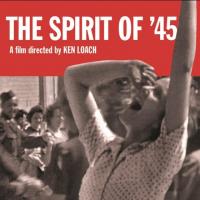
Ken Loach: "I want people to be angry"
This film is a documentary, interviewing people who remember the mass movement to create the welfare state following World War Two. Ken Loach was asked after the film showing in Cardiff why he made the film.
"I want people to be angry," Ken Loach said. "This is not about history. It’s about the fact that society doesn’t have to be this way. We can seize control of the economy, protect the environment, share out the work. You can only plan what you own – collectively for the benefit of all! Another world is possible. My god, we have to change it."
The film shows the contrast between the poverty of the 1930s and the hopes and aspirations of the working class that there should be no return to these conditions. One contributor from Liverpool described his living conditions before the war, with all the children getting into a bed every night which was crawling with vermin. The happiest moment in his life was moving into a new council house.
Homelessness today
With the 50% increase in homeless families now and the attacks on housing benefits, it shows why the mass house building programme following the war was so important. In Wales some of the temporary accommodation, the prefabs, are still being lived in.
Tony Mulhearn, one of the Liverpool 47 councillors who stood up to the Thatcher government, was one of the film’s interviewees. He gave a strong example of what politicians should be doing now to improve working class people’s lives. Liverpool city council in the 80s showed that the ’Spirit of ’45’ was not some historical event but an example of what working class people can achieve, tangibly in bricks and mortar, when we fight together.
The film does not give a total sense of the mass revolutionary wave in society with demobbed soldiers determined that after defeating fascism they should build a better world free from squalor and poverty. The 1945 Labour government was elected on a wave of confidence and pushed much further to the left than politicians originally planned.
The ruling class was terrified that the workers would take power in Britain and change society, and conceded unprecedented reforms with the nationalisation of gas, electricity, coal and transport and the creation of the NHS. All these made a massive difference to people’s lives and showed the advantage and logic of providing services, utilities and transport planned on a nationwide basis.
The creation of the welfare state and nationalisation at a time when Britain was bankrupt shows what can be done now to stop all the cuts and invest in jobs and services. The ruling class can always find money when it is necessary to protect their system.
One Welsh contributor, Ray Davies, describes how following the death of his mother pregnant for the tenth time, the doctor told him that ’but for a pint of blood your mam would have lived’. You cannot have a more succinct description of why we need a national health service free at the point of demand.
The film clearly shows the limitations of the way the nationalisation was done, just swopping the bosses for more of the same and with no workers’ control. There were also concessions made to create the NHS, leaving private healthcare in place and "stuffing the consultants’ mouths with gold".
Political
The creation of the welfare state was a massive step forward but only a glimpse of what could be achieved with workers’ control and management of society.
The film exposes the current lack of a mass political alternative standing up for the working class. It lets the audience draw the conclusion that we need to build a new political voice. Loach was very clear in the questions after the showing that we need a new political formation representing the working class and that unions should turn the funding tap to New Labour off, as well as his support for TUSC.
Everyone should see this film. It clearly shows the massive gains that the working class made following the war, but we can also use the film to increase people’s confidence and raise expectations about what we can achieve now.
Let’s take the opportunity to leaflet all the audiences to get everyone more involved in the battles to save the welfare state and in the discussion about how to build a better society, a socialist society, which meets the needs of all.

Be the first to comment